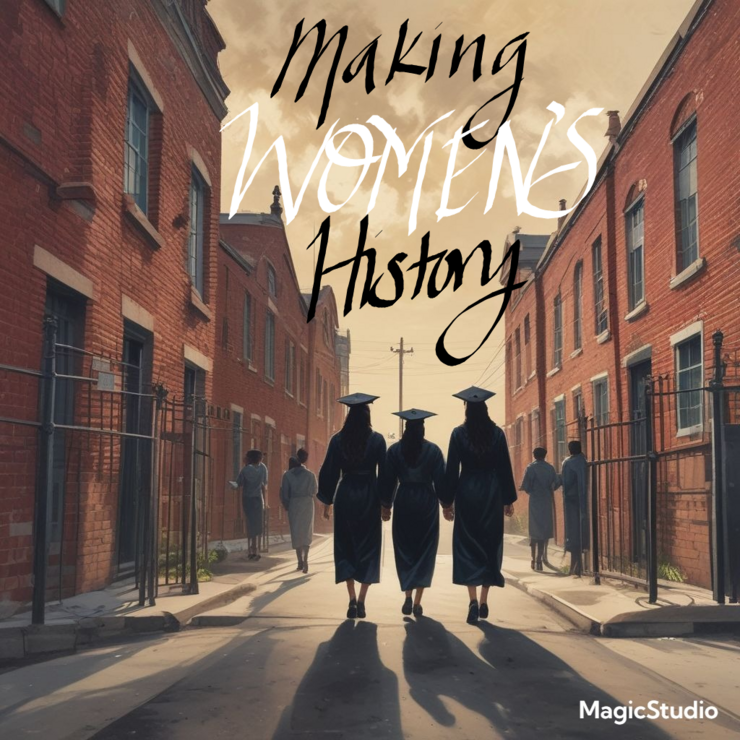Posted on March 27, 2024
1 COMMENTS

Women’s History Month began as a congressional joint resolution in 1981 and a presidential proclamation from Jimmy Carter to declare a week of celebratory observance for “American women of every race, class, and ethnic background whose roles and contributions had been consistently overlooked and undervalued in the body of American History.”
Between 1978 and 2007 incarceration rates for women rose by 560% compared with the 240% increase of men. Although the population of men has always been larger than the population of women in carceral spaces, the alarmingly overlooked fact about carceral trends is that the incarceration of women has steadily outpaced the growth rates of men’s incarceration. (https://www.annualreviews.org/doi/10.1146/annurev-criminol-030421-041559).
I first arrived at the Women’s Center of Maine Correctional Center (MCC) in 2018. As a woman serving an 11-year sentence, I began to inquire about post-secondary education programs almost immediately. During my intake classification, my caseworker even included my request to take college psychology classes as part of my case plan. However, months later, I learned that there were no matriculated or credit-bearing programs for the women of MCC. How could this be? The men had a college program; surely this must be a misunderstanding that could be cured with a simple conversation.
I met with the woman who was the unit manager of the Women’s Center at the time, hoping to receive permission to enroll in college, but the conversation was devastating. She told me that the Women’s Center didn’t have a degree program and that I would have to wait until I was transferred to the Southern Maine Women’s Reentry Center. The tears that welled up in my eyes made me feel childish. My cheeks burned when I asked her, “You want me to wait? What am I supposed to do for six years? Why can’t we start a program here for women like me?”
My story didn’t end there, and “no” will not be the final word for other incarcerated women who are denied access to education. My next steps carried me to advocacy meetings; I opened a dialogue with the unit’s mental health clinician so that she could document my struggle and help me cope until I found a solution; then, I put pen to paper and wrote to advocates, legislators, and central administration. I received a response from the Deputy Commissioner that pledged to establish post-secondary services for the women’s population with a promise to support my endeavor to pilot matriculation for women serving sentences exceeding four years.
In 2019, I became the first woman in my facility to be enrolled in a degree program and in 2021, with the expansion of the university’s Prison Education Partnership and generous funding from the Mellon Foundation that was applied for with assistance from the Maine Prisoner Advocacy Coalition to create the first Liberal Arts associate cohort for women.
I may have walked out of that office feeling defeated and alone but I wasn’t alone. There were more women like me - and there still are, all across the world - who want to invest their time and energy toward self-actualization, perhaps for the first time in their lives.
Title IX was passed in 1972 to prohibit sex discrimination in all educational programs that receive federal support, but sadly, incarcerated women continue to struggle against inequality in prison education spaces to this day, but despite this fact, many prisons and jails fail to offer program parity to female and gender-nonconforming prisoners in comparison to their male counterparts. A 2018 report by the Texas Criminal Justice Coalition showed that men incarcerated in Texas had access to more than double the educational programming opportunities than were offered to women; this gender-based disparity in access to programs is a common phenomenon in prison systems.
Alexa Garza, an accomplished scholar in a Texas women’s prison, worked hard to earn her degrees in a system that limited achievements for women, first obtaining two associates degrees before earning her baccalaureate. Similar to my experience, Alexa advocated for an equal chance to pursue success in an institution that already had long-established pathways for incarcerated men to earn advanced degrees. Today, Alexa is a justice fellow for the Education Trust and I am a fellow for the Alliance for Higher Education in Prison; we are but two examples of women who have successfully challenged gender-disparate access to education from behind prison walls, and if this is your story too, I invite you to share it with us.
Since I took my first steps in prison education, I have had the opportunity to take philosophy and web design courses with The Educational Justice Institute at MIT and have served as a teaching assistant with their programs for the last three years; I have been blessed to engage in a paid work-learning position as a fellow with the Alliance since last March, and have used my wages to pay taxes, support my family, and save for reentry; and at the conclusion of the Fall 2024 semester, I will be graduating from the University of Maine at Augusta with a bachelor’s degree in interdisciplinary studies. Never say never. Never give up.
Educational journeys are not isolated experiences and any student, especially those who are incarcerated and particularly women, cannot thrive without support and allyship. Women face unique barriers in prison education that limits their futures in professional spaces by depriving them of academic and vocational engagement, reinforcing gender stereotypes in programming, and failing to properly resource women’s facilities and units to be conducive to the achievement of marketable skills and credentials. In honor of Women’s History Month, let us dedicate our efforts to making the neglect of women’s educational needs a thing of the past.
Works Cited:
Heimer, K., Malone, S. E., & De Coster, S. (2023). Trends in women’s incarceration rates in US prisons and jails: A tale of inequalities. Annual Review of Criminology, 6(1), 85–106. https://doi.org/10.1146/annurev-criminol-030421-041559
Nittle, N., & Nittle, N. (2022, May 6). In Texas prisons, men have access to significantly more higher education programs than women. The 19th. https://19thnews.org/2022/05/texas-prison-higher-education-system-inequity/
The Texas Criminal Justice Coalition, & Linder, J. D. (2018). An Unsupported Population: The Treatment of Women in Texas’ Criminal Justice System. https://www.texascjc.org/. Retrieved March 27, 2024, from https://www.prisonpolicy.org/scans/tcjc/Womens_Report_Part_2.pdf




Comments
Permalink
Comment by Mackenzie Niness on Tue, 04/02/2024 - 14:56
Thank you for sharing your story and for highlighting these disparities. This is really important work!